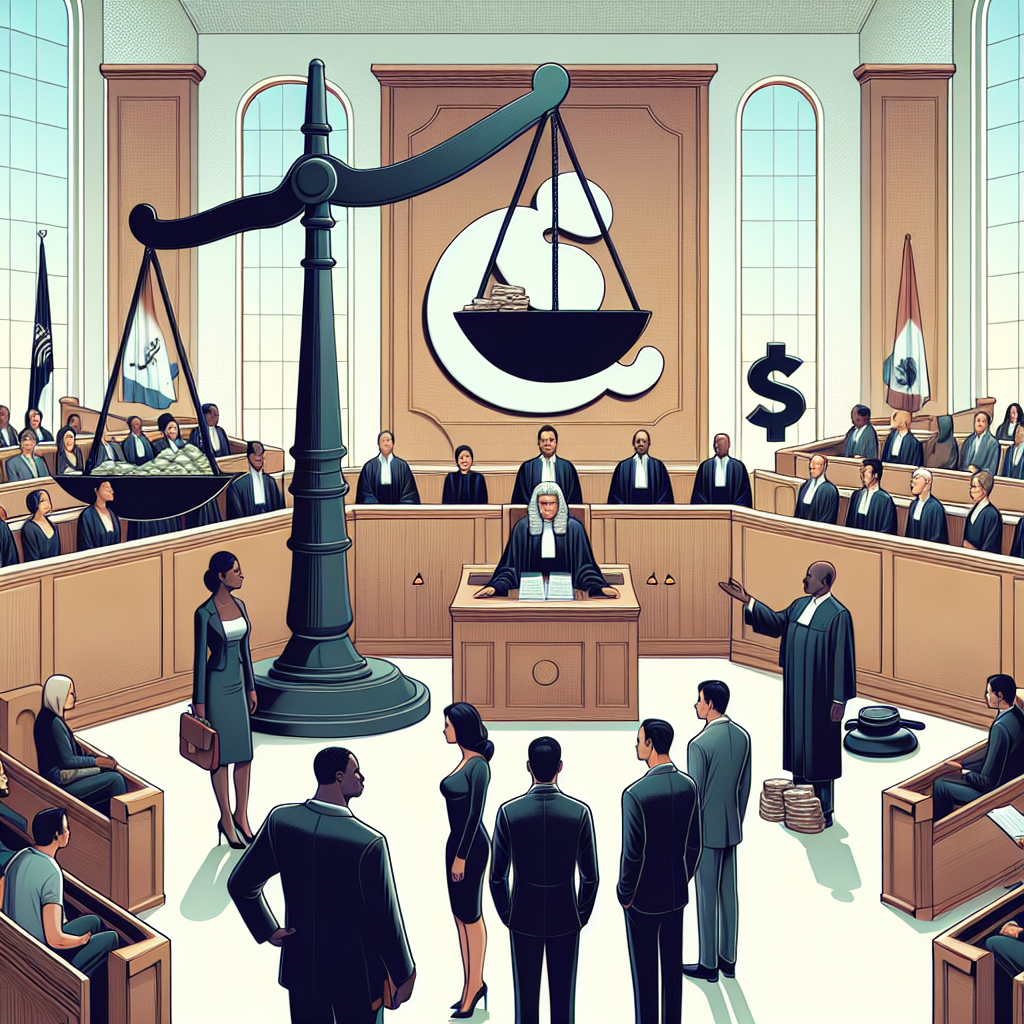The legal landscape surrounding copyright infringement is poised for significant scrutiny as a major court case approaches. The upcoming session, scheduled for December 1, will address a billion-dollar judgment against Cox Communications, stemming from its alleged failure to prevent copyright infringement among its subscribers. This case, brought forth by Sony Entertainment, highlights the complex relationship between internet service providers (ISPs) and copyright holders in the digital age.
Background of the Case
In the realm of copyright law, the battle against unauthorized distribution of digital content has intensified. The case of Cox Communications v. Sony Entertainment serves as a pivotal example. Sony has successfully demonstrated that a significant number of Cox’s subscribers have engaged in blatant copyright infringement by downloading and sharing copyrighted materials without the permission of the rights holders. This situation has raised critical questions about the responsibilities of ISPs in monitoring their users’ activities.
Cox Communications argues that it is unreasonable to expect an ISP to monitor millions of notices received annually, most of which are automated alerts generated by bots monitoring file-sharing networks. Despite this argument, the jury found Cox’s defense unconvincing, leading to a substantial potential liability exceeding $1 billion. The implications of this case extend beyond financial repercussions, as they may redefine the boundaries of liability for ISPs.
The Role of Internet Service Providers
ISPs like Cox Communications typically provide general internet access, which complicates their liability for the actions of individual users. Cox posits that it does not actively encourage or facilitate infringement; however, the court’s previous rulings in similar cases, such as challenging void judgments, suggest that the courts may not fully accept this defense. The outcome of this case could set a precedent that affects how ISPs operate in relation to copyright enforcement.
As the digital landscape continues to evolve, the responsibilities of ISPs are under increasing scrutiny. The court’s decision may compel ISPs to adopt more robust measures for monitoring user behavior or risk facing similar lawsuits in the future. This situation raises fundamental questions about the balance between user privacy and the enforcement of copyright law.
Potential Implications
The ramifications of the court’s ruling in this case extend well beyond the immediate financial stakes. A decision against Cox could prompt other ISPs to reevaluate their policies regarding copyright infringement. Additionally, it may encourage content providers to pursue legal action against ISPs more aggressively, seeking to hold them accountable for their users’ actions.
Furthermore, the case underscores the ongoing tension between technology and copyright law. As more consumers turn to digital platforms for entertainment, the need for effective copyright enforcement becomes increasingly critical. The court’s ruling may lead to enhanced technological measures to protect copyrighted content, influencing how content is distributed and accessed online.

In light of these developments, stakeholders in the digital content industry are closely monitoring the case. The outcome could reshape the landscape of copyright enforcement and influence future litigation involving ISPs and content providers. For instance, the recent reinstatement of federal research grants amid controversy highlights the need for clarity in legal standards.
The upcoming court session is poised to address a pivotal case involving copyright infringement that could have far-reaching implications for internet service providers (ISPs) and content creators alike. The case, Cox Communications v. Sony Entertainment, centers on a billion-dollar judgment that reflects the ongoing struggle between copyright holders and digital service providers. As the court prepares to review the ruling, it is essential to understand the nuances of the case and the broader context of copyright enforcement in the digital age.
Background of the Case
The origins of the case date back to allegations that Cox Communications failed to take adequate measures to prevent its subscribers from engaging in copyright infringement. Sony Entertainment successfully demonstrated that numerous Cox customers were repeatedly infringing on copyrights by downloading and distributing protected content without proper authorization. Despite receiving multiple notices from Sony and other content providers regarding these infringements, Cox continued to offer internet services to these users.
Cox’s defense hinges on the argument that it is merely a provider of a general-purpose internet connection, not a facilitator of copyright infringement. The company asserts that it receives an overwhelming number of notices each year, many of which are automated and do not warrant immediate action. This perspective was ultimately unconvincing to the jury, which found that Cox’s inaction constituted a failure to adequately address the issue of copyright infringement among its subscribers.
Legal Implications and Industry Reactions
The potential financial repercussions for Cox are staggering, with damages exceeding $1 billion at stake. This case not only highlights the responsibilities of ISPs in monitoring their networks but also raises critical questions about the viability of the current copyright enforcement framework. Industry experts are closely watching as the court weighs the balance between protecting intellectual property rights and the operational realities faced by ISPs.
Moreover, this case could set a significant precedent regarding the obligations of ISPs in the realm of copyright enforcement. Should the court uphold the lower court’s ruling, it may encourage content providers to pursue similar actions against other ISPs that fail to act against infringing users. The outcome of this case could redefine the landscape of copyright enforcement and the relationship between content creators and service providers.

Broader Context of Copyright Enforcement
The ongoing battle over copyright infringement is not limited to this single case; it reflects a larger trend in the digital age where unauthorized distribution of content is rampant. As the internet continues to evolve, copyright holders are increasingly turning to ISPs as the last line of defense against widespread infringement. This trend raises important questions about the responsibility of ISPs to monitor user behavior and the extent to which they can be held liable for their users’ actions.
In light of this case, many are considering the implications of the immediate appeal rights that may arise should Cox seek to contest the ruling. The legal arguments presented in this case could also resonate with other ongoing disputes, such as religious liberty claims and major election law cases, as they all grapple with the complexities of rights and responsibilities in a digital society.
The impending court decision regarding the billion-dollar judgment against Cox Communications for copyright infringement is poised to have significant implications for internet service providers (ISPs) and copyright holders alike. This case, which centers around the responsibilities of ISPs in monitoring and addressing copyright violations by their users, raises critical questions about the balance between user privacy and copyright enforcement. As the court prepares to deliberate, the outcome may set a precedent that could reshape the landscape of copyright law in the digital age.
Legal Responsibilities of Internet Service Providers
At the heart of the case is the assertion that Cox Communications failed to take adequate measures to prevent its users from engaging in copyright infringement. The plaintiff, Sony Entertainment, has presented evidence indicating that a substantial number of Cox’s subscribers have been involved in unauthorized downloading and sharing of copyrighted materials. This situation highlights the ongoing struggle between content creators and ISPs, as the latter often argue that they cannot be held responsible for the actions of their users.
Cox contends that it provides a general-purpose internet connection and that it cannot feasibly monitor every user’s activity. The company has received millions of notices regarding alleged copyright violations, primarily generated by automated systems. However, the jury found Cox’s defense unconvincing, resulting in the potential for a hefty financial penalty. This case exemplifies the challenges faced by ISPs in navigating the complex web of copyright law while maintaining user privacy and service integrity.

Implications for Copyright Enforcement
The outcome of this case could significantly influence how copyright enforcement is approached in the United States. If the court rules in favor of Sony, it may establish a precedent that encourages stricter monitoring practices by ISPs, potentially leading to a more proactive stance on copyright infringement. Conversely, a ruling in favor of Cox could affirm the notion that ISPs should not be held liable for the actions of their users, which may embolden users to continue their current practices without fear of repercussion.
Furthermore, the ruling could impact the strategies employed by content providers in their efforts to combat piracy. For instance, companies may need to explore alternative methods of protecting their intellectual property, such as enhancing technological controls or seeking legislative changes to better align copyright laws with the realities of the digital landscape. As the court weighs these considerations, the implications for both ISPs and content creators remain profound.
Future of Copyright Law
The decision in this case will not only affect the financial standing of Cox Communications but could also have broader ramifications for the future of copyright law. As digital content continues to proliferate, the need for clear guidelines regarding the responsibilities of ISPs becomes increasingly urgent. The court’s ruling may serve as a catalyst for legislative changes that address the evolving nature of copyright infringement in the digital age.
In the wake of the trial, many industry stakeholders are closely monitoring the proceedings, recognizing that the implications extend beyond this specific case. The potential for a billion-dollar judgment underscores the stakes involved in copyright enforcement and the responsibilities of ISPs. As the court deliberates, the outcome could redefine the relationship between ISPs, content creators, and users, ultimately shaping the future of digital copyright law.
For those interested in similar legal challenges, the recent talc lawsuit setback highlights the complexities of navigating legal disputes in the modern landscape. As copyright issues continue to evolve, the decisions made in cases like Cox Communications v. Sony Entertainment will undoubtedly resonate throughout the legal community and beyond.